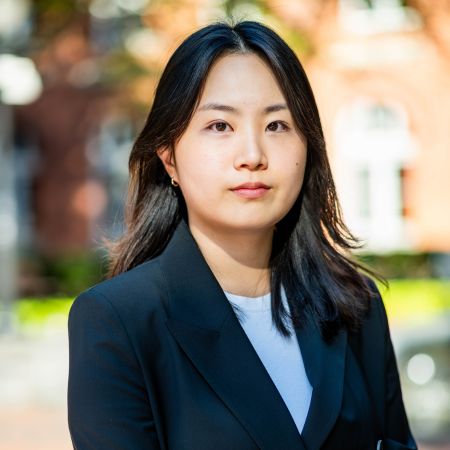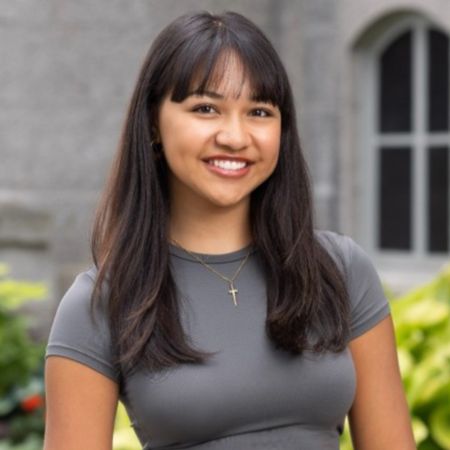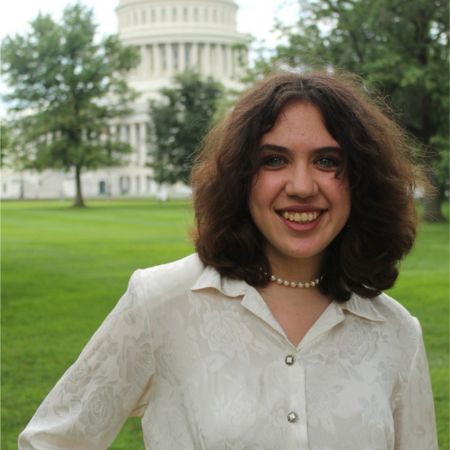Associates
Current Associate
Jessalyn Wienk | Augustana University, InterReligious Studies and International Studies, BA`26
Research Title: “Sectarian Fault Lines in Post-Assad Syria: Religious Freedom and the Future of Minority Communities in Transitional Syria”
Research Description: The research explores the evolving situation of religious minorities in Syria—such as Christians, Alawites, Yazidis, and Druze—during the country’s current transitional period under Ahmed al-Sharaa’s leadership. While the Assad regime was authoritarian, it maintained a degree of protection for minority communities by positioning itself against extremist groups. In the aftermath of Assad’s fall, however, Syria faces growing instability, and signs of escalating sectarian tensions are emerging: attacks on Christian churches, kidnappings of Alawite women, and clashes between Bedouins and Druze in the south. This study would examine these developments specifically through a religious freedom lens—asking how fundamental rights, protections, and freedoms for minority faith communities are shifting amid Syria’s political transition. A critical component of this study would be analyzing the role of the Autonomous Administration of North and East Syria (AANES), whose governance model and approach to pluralism and local autonomy could either stabilize or pose new challenges for religious coexistence. Ultimately, the project aims to assess how religious communities are navigating this uncertain moment, explore the prospects for greater pluralism or renewed persecution, and examine the implications that Syria’s internal religious dynamics hold for broader regional stability in the Middle East.
Past Associates
Reese Kimmi | Kansas Wesleyan University, Criminal Justice and Sociology, BA`26
Abstract: The purpose of this study is to investigate the relationships between location, religious affiliation, and political behavior. The research factor of location is separated into two groups: rural and urban individuals. Religious affiliation is measured in several ways, but self-identified religious identity is the primary characteristic used to determine it. Several forms of political behavior are examined, including voting, legislative advocacy, lobbying, and public protests. This paper utilizes a combination of polling data, analysis publications, individual testimony, and opinion pieces to provide a comprehensive understanding of how politics operate in America, from both a technical (data-driven) and a practical (individual-based) perspective. The study’s results yield several key conclusions. First, location does affect voting; rural voters have a unique set of struggles, morals, and experiences that more often inspire a Republican vote. Urban voters, and their unique struggles, morals, and experiences, tend to correlate more often with a Democratic vote. Religious affiliation often inspires morals and values. Paired with the experiences faced in different environments, we see connections between location, religious affiliation, and political behavior. Understanding the interplay among these three factors is crucial for understanding the future of American politics.
Mia Clevano | Marymount University, Communications & Theology and Religious Studies, BA`26
“One Nation Under God: The Political Influence of Religion in a Secular United States”
Abstract: This study examines the role of religion in shaping political discourse in the United States, with a particular focus on the intersection of religious beliefs and political actions. It explores how specific religious groups, including Catholic and Jewish communities, and Indigenous traditions, influence American politics on key issues such as immigration, abortion, and environmental policy. By analyzing the historical development of religious freedom and the constitutional framework provided by the First Amendment, the study highlights how religious liberty is both protected and challenged within a pluralistic democracy. The research demonstrates that religion in the United States is not a singular or uniform force but a diverse set of traditions that contribute distinct moral and ethical perspectives to public life. Catholic social teaching emphasizes compassion and the dignity of immigrants, often standing in opposition to restrictive immigration policies. Jewish ethical frameworks bring nuanced interpretations to the debate over abortion, grounded in religious law and historical experience. Indigenous spiritual traditions advocate for environmental justice through a sacred relationship with the land, emphasizing the interconnectedness of all living beings. These perspectives not only inform community values but also shape broader political debates. The study concludes that religious freedom in the United States should be understood as a dynamic and ongoing negotiation among individual rights, collective identities, and constitutional principles, contributing to a more inclusive and ethically grounded democratic society.
Jungyeon Lee | Georgetown University, Government and Sociology, BA`26
“Religion and Demographic Shifts: Analyzing Population Trends Using Durkheim’s Theory”
Abstract: Global population dynamics have undergone significant transformations, with declining fertility rates in developed nations and shifting patterns of religiosity. This study examines the relationship between religiosity and fertility, exploring whether religiosity is a primary driver of reproductive behavior or a component of broader modernization processes. While previous research has largely focused on demographic changes through cultural, economic, and modernization perspectives, the role of religiosity remains underexplored. The study uses sociological frameworks to analyze religion and modernization, incorporating case studies of three nations—the United States, South Korea, and Nigeria—each with distinct historical trajectories, levels of religiosity, and degrees of modernization. The findings indicate that modernization plays a predominant role in shaping fertility behaviors, with religiosity serving as a moderating influence rather than a primary determinant. As societies modernize to survive in a competitive international arena, traditional sources of legitimacy—religion—weaken, affecting fertility patterns. However, in cases where alternative social structures fail to replace traditional legitimacy, modernization may exacerbate demographic crises as seen in declining fertility rates. The research highlights the necessity or reassessing social cohesion mechanisms in an era of declining religiosity to mitigate the unintended consequences of modernization on population trends.
Joon Park | The George Washington University, International Affairs and Finance, Economics, BS`26
Research Title: “Echoes of the Past: The Rise of Right-Wing Populism in Europe in the Early 20th Century and Today“
Research Description: The resurgence of right-wing populism in contemporary Europe, resembling historical precedents such as pre-Third Reich Germany in the early 20th century, urges a deeper understanding of the societal, economic, political, and faith-based conditions that led to the populist movements and the marginalization of minority communities. This research aims to dissect these conditions by drawing historical parallels and analyzing the current political climate across various European countries. It will specifically explore how economic downturns, social disparities, political rhetoric, and religious narratives converge to amplify populist sentiments. The study will also assess the impacts on immigrant and minority communities, focusing on how faith and religious identity play roles in both the propagation and opposition of populist ideologies. By comparing early 20th-century developments as well as modern patterns of populist movements, this research seeks to provide insights into the cyclical nature of populism and its effects on social cohesion, integration, and interfaith dynamics in Europe.
Natalie Dolenga | Syracuse University, International Relations, Spanish, BA`24
Abstract: This paper examines the intersection of immigration, integration, and religion within the EU-Mediterranean framework, aiming to understand how migration from the southern Mediterranean region to Europe interacts with integrative policies and religious landscapes. The first section provides a background on the EU-Mediterranean relationship, detailing the refugee “crisis” of 2015 and the evolution of the current policy framework. The analysis then progresses through four case studies of key EU Member States–France, Spain, Italy, and Greece that significantly shape broader EU policies. These case studies assess the effectiveness and limitations of each approach to managing immigration, facilitating integration, and addressing religious diversity. Ultimately, this paper highlights the notable successes and critical shortcomings in these countries’ policy frameworks, emphasizing the importance of enhanced interfaith dialogue and more inclusive policymaking to effectively integrate Muslim populations from south of the Mediterranean and manage immigration on a large scale.
Jacqueline Bucaro | Georgetown University, School of Foreign Service, Regional and Comparative Studies, BA`25
“Islam and the Latin American Diaspora: Exploring Cultural Connections“
Abstract: This paper examines the Latino Muslim community in both Latin America and the United States to explain why Latino Americans are the fastest-growing demographic among converts to Islam. The first half of this paper outlines the history of Islam in Latin America from colonization until the present day, drawing on existing research and consultations with figures in local Muslim communities to understand why Islam`s growth in Latin America is limited. The second half focuses on the Latino Muslim community in the United States, exploring the movement’s history to draw out the historical, political, and cultural factors that connect Latinos to Islam in the United States. Ultimately, this paper argues that Islamic values and Latino culture are already close together, and it is the shared political struggle of Muslims and Latinos in the United States that breaks down Islamophobia and allows would-be Latino converts to approach Islam.
Wyatt Flicker | University of Delaware, International Relations, Ancient Greek and Roman Studies, History, BA`26
“Prophetic Politics: Islamic Readings of Plato’s Republic“
Abstract: This paper examines the interplay between the Islamic and Platonic philosophical traditions through the lens of medieval receptions of The Republic. By constructing a comparative analysis between the source materials, the Quran and The Republic, the paper identifies the traditions as not only compatible but also in active conversation. This active conversation dates back to the beginning of the Islamic tradition and plays a central role in the political thinking of al-Farabi, Ibn Sina, and Ibn Rushd. Considering the nature and structure of the ruler, citizen, and society as a whole through the eyes of these philosophers, this paper presents medieval Islamic Platonism as a coherent philosophical worldview, connecting the issues raised in Plato’s dialogues with the Islamic philosophical substrate. By presenting medieval Islam as a valid school of political philosophy, this paper seems to broaden the general conception of Neoplatonic thought and highlight the contributions of Muslim thinkers in the Western Hellenic-derived philosophical canon.
Liam Adamczyk | Boston College, History and Theology, BA`25
“Loss of Identity: The Religious Passiveness of American Youth“
Abstract: This research aims to learn about the decline in religion among American teenagers and young adults. More specifically, it looks at the growing passiveness and the increase in religious “nones” among these groups and identifies significant reasons for the growth in passiveness and unaffiliating. The author wanted to undertake this project to understand what is changing in American culture, leading to lower levels of religiosity. Although religious affiliation is higher than two hundred years ago, many self-identify within the group but do not practice—the research aimed to unpack the numbers on religion in the United States and see what they meant. The core of the study is based on data compiled from national polling agencies. After finding the data, reports, articles, and academic texts are synthesized to understand religious pheromones while looking at religious beliefs and behavior. Then, the study found how generational differences play a significant role in the decline in religiosity. Family life, technology, and current events are all responsible for the fall, not to mention institutional issues causing a lack of trust or desire to affiliate with a religious group. Overall, the paper found that the decline in religion among American youths and young adults will continue. As American culture grows secular and tensions weaken, people will steadily lose faith.
Millicent Caughey | Duke University, Religious Studies and History, BA`25
“Faith and the Law: The Extent of Religious Freedom in Modern America”
Abstract: Under the US Constitution, every American is guaranteed a right to believe and practice the faith they choose freely. However, in practice, true religious toleration is incredibly difficult. The interwoven nature of many religious people, their faith, ethics, and politics often makes the three difficult to parse out. While much Christian tradition and thought has been treated as secular, more obscure faith traditions have been banned or made difficult. In my research, I want to understand the limitations of religious freedom in the United States from two perspectives. First, I want to understand what religious freedom means in a country with a profoundly religious history, and second, I want to examine how modern jurisprudence treats religious liberty issues. Ultimately, I want to understand the extent to which religious practice in the country is truly free, the nature of the so-called paradox of religious freedom, and the extent to which it is the law’s fault.
Jose Serna | Augustana University, Government and Sociology, BA`24
“Exploring the Roles and Resources that Chaplains Provide in Healthcare Settings”
Abstract: Chaplains are in healthcare facilities nationwide to help complete healthcare teams. They can help bridge the gap between patients’ medical decisions and their religious beliefs. A chaplain brings a spiritual side to patient care that other healthcare professionals can not. They have an encompassing role in healthcare because they can view patients holistically. The COVID-19 pandemic, where they were on the front lines, was an example of how they can act as a listening ear in times of fear, distress, and uncertainty. Additionally, chaplains provide support and resources to patients and healthcare professionals of all faiths. Chaplains are essential in healthcare settings, where faith is intertwined with patient care. Chaplains in a healthcare setting must accept any patient regardless of their faith background. Interfaith chaplains receive training in working with people from all religious backgrounds and beliefs.
Dana Sultan | The George Washington University, Middle East Studies, BA`24
“Abraham and Covenants in the Quran: A Scriptural Analysis with Biblical References”
Abstract: The Biblical Abrahamic Covenant has served as a central inspiration to a great deal of modern scholarship. Consideration of this fact begs the question– is there an Abrahamic Covenant in the Quran? If so, what does this covenant entail? The most direct response to this question is that the Quran specifies multiple covenants made between God and Abraham. Yet these covenants may all, in a sense, be contextualized to one covenant that was established pre-eternally with all the descendants of the Children of Adam, the Primordial Covenant. This article provides a thorough scriptural analysis of the covenants made between God and Abraham as they are narrated in the Quran and simultaneously seeks to contextualize these covenants with three key concepts: monotheism, submission to God, and the notion of an innate nature that exists within all of humanity– the Islamic fitra. It will additionally utilize an interfaith approach to answer the research question by incorporating Biblical verses into the scriptural analysis.
Sascha Shroff | American University, SIS, International Studies, BA`24
Abstract: Religious spaces and institutions have the ability to help uplift women by addressing gender gaps and combating gender-based violence that prevails in varying religious spaces and traditions. With religion and culture being intertwined in many spaces, it is essential that religious leaders work to ensure that women are held to equal value to men in the religious setting. In many religious traditions, women are held to a high value, a value and practice that helps combat gender discrimination and violence against women. Along with this, different religious organizations have even used religious texts and traditions to help combat gender-based violence and discrimination in different contexts.
Ayse Pirge | The College of William and Mary, English, BA`21
“European Identities in the Context of Orientalism and Cultural Ambiguities”
Abstract: Jovan Cvijić’s 1918 “Ethnographic map of the Balkan Peninsula” categorizes certain ethnic groups in terms of religious identity. For adherents of Islam, the term “Moslemized” is used – with the exception of Turks and Tatars, who are described as “Moslem.” The former label indicates a state of passiveness, suggesting that the European Muslims are influenced by external factors that are inherently non-European and Islamic, as opposed to Turks and Tatars, who are the Oriental ‘Other’ and thus non-European. This idea is related to the concept of ‘nesting Orientalisms’ as defined by Milica Bakic-Hayden. While not limited to Albanian, Bosnian, and other predominantly Muslim ethnicities, the negative perspectives regarding Islam have played a role in the construction of “Muslimized,” rather than “Muslim” identities. It is also important to consider the ethnoreligious tensions which have shaped the Balkan Peninsula, and the catastrophic events which have still yet to be fully resolved.
Bailey Haraburda | The Catholic University of America, Sociology, BA`23, MA`24
“I Was a Stranger and You Welcomed Me: The Role of Faith-Based Organizations in Immigration”
Abstract: This research extends a paper I wrote entitled “Barriers to Mental Health Care Utilization Among American Latinos and Partnership Opportunities with Faith-Based Organizations.” For my project with the Rumi Forum, I focused specifically on exploring the work of Faith-Based Organizations (FBO) in the Washington metropolitan area (DMV) with immigrants. Immigrants to the United States face cultural stress, social marginalization, and discrimination. Refugees and asylum-seekers also experience trauma stemming from violence and persecution in their home country, leaving their homes and the dangerous journey to the United States, and the arduous process of seeking asylum. I contacted FBOs in Christian, Jewish, Islamic, and Sikh faiths that assist immigrants with legal status, and access to medical and mental health care, employment, and housing.
Mona Elsaai | Emory University, Political Science, BA`19
Abstract: The purpose of the research is to comment on reconstruction projects that promote values of religious freedom and exercise in formerly ISIL-controlled areas- more specifically Iraq. This paper does not advance a particular if-then clause; instead, it aims to comment on the nature of the projects in terms of their purpose, the composition of their task forces, and the goals to be accomplished as well as the limitations endured. Reconstruction projects are most broadly differentiated by 1) whether they are homegrown or international, which influences 2) the composition of their task forces, which in turn influences 3) the nature and scope of their goals and purpose. Furthermore, 4) the faith community participating in or affected by the reconstruction or for which these efforts are being carried out influences the composition of the task force, the purpose of the project, and the outreach it aims to have in terms of whether or not a religious minority is willing to participate in the reconstruction projects of another religious group.



















